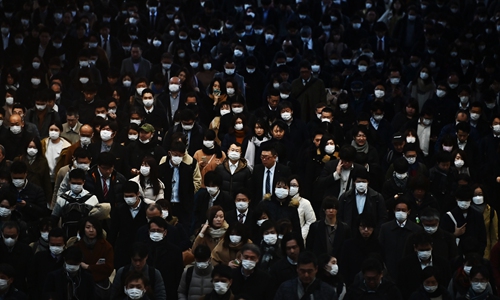HOME >> CHINA,SPECIAL-COVERAGE
Origin of novel coronavirus still hangs in the air
By GT staff reporters Source:Global Times Published: 2020/2/29 0:38:40
Infection cases of unknown source complicate COVID-19 knowledge

Mask-clad commuters make their way to work during morning rush hour at the Shinagawa train station in Tokyo on Friday. Tokyo's key Nikkei index plunged 805 points to close at 21,145 on Friday after US and European selloffs with investors worried about the economic impact of the coronavirus outbreak. Photo: AFP
More efforts are needed to uncover the mysterious nature of the novel coronavirus, experts say, as more cases showing no travel history to infected areas or contact with patients have been reported in countries such as the US, further complicating the discussions about the origin of the virus.
Given that the source of the virus has not been identified and scientists have not made major breakthroughs on relevant research, experts said countries should remain open-minded and work together by abandoning a political quagmire and conspiracy theories.
When it comes to the origin of the novel coronavirus pneumonia (COVID-19) outbreak, China is the first location that people would think of. However, the situation is getting worse in other countries. "Although the outbreak first occurred in China, it does not necessarily mean it originated here," Zhong Nanshan, a prestigious respiratory specialist, told a press conference on Thursday.
His remarks raised questions to scientists across the world while they race to learn more about the virus that has caused more than 82,000 infections globally, and pin down the sources to help prevent more outbreaks.
Although the World Health Organization confirmed that the virus' outbreak was first reported in Wuhan, Central China's Hubei Province, Zeng Guang, chief epidemiologist at the Chinese Center for Disease Control and Prevention, told the Global Times on Friday that there is no direct evidence to link the origin of the virus so far, especially as some patients reported outside China have never been to epidemic-stricken areas or contacted people with infections.
A patient in California diagnosed with coronavirus infection did not travel anywhere known to have the virus, the US Centers for Disease Control and Prevention announced Wednesday night. The patient was also not exposed to anyone infected.
That patient was the first case of an unknown origin in the US, according to local health authorities. The US CDC on Thursday also revised the Criteria to Guide Evaluation of PUI for COVID-19, adding no source of exposure has been identified.
The mysterious nature of this case is significant, Dr. Dean Blumberg, an infectious disease specialist at UC Davis Medical Center, told CNN affiliate KCRA.
"And you have to realize that this virus is so new, that none of us have any immunity to it. So, anybody who's exposed is at high risk of getting infected with this," Blumberg said.
Japanese media TV Asahi previously reported that some patients in the US who died from the flu might have actually been killed by coronavirus. This has added more concerns about the virus' origin, which some said actually originated in the US rather than China, observers noted.
Although the US CDC refuted the report later, saying that there is no evidence to support the statement of TV Asahi, Zeng said the speculation still deserves attention, noting the unusual flu epidemic in 2019 in the US.
Some online posts also raised questions about whether the US had missed the opportunity of testing flu-like cases with nucleic acid kits in the flu epidemic, because if more tests are made, more cases would be identified, outlining the coronavirus epidemic situation in the country.
"The US CDC can conduct antibody tests [also known as serological tests] with recovered flu patients. If the test turns positive, it will be a direct clue of the virus' origin," Zeng said.
US CDC officials have warned of the possibility of a community spread in the US. Under such circumstance, Zeng called on the US to be more transparent in epidemic related information and more cooperative with the international community.
Singapore said it has successfully come up with the first use of an antibody test to track coronavirus infections, which can detect the source of clusters of infections in certain cases, media reported on Friday.
Limited understanding about the virus was also seen as a major challenge for the global community in handling the public health crisis, and countries were urged to stop using political conspiracies. They should instead work together to fight the disease, analysts said.

Staff in protective suits are seen near the cruise ship "Diamond Princess" in Yokohama, Japan, on Feb. 6, 2020. Photo:Xinhua
Globally, there have been 82,294 confirmed cases, with 3,664 of these cases outside of China. Nine new countries - Brazil, Denmark, Estonia, Georgia, Greece, Norway, Pakistan, Romania, and North Macedonia - reported cases of COVID-19 in the past 24 hours, WHO data shows.
Experts called for global cooperation to prevent the spread of the illness, with more infectious disease experts warning that the outbreak, without a known source of infection, could be just the tip of the iceberg.
After Zhong's remarks went viral, some Western media outlets said that he was trying to shield China from responsibility. But most people who listened carefully to him said the remarks are scientific and rigorous as what he really means is that the conclusion can only be made after scientific research.
When US politicians like Tom Cotton put forward a Chinese coronavirus conspiracy, suggesting the virus came from an infectious disease research lab, a group of 27 prominent public health scientists from outside China pushed back. "The rapid, open, and transparent sharing of data on this outbreak is now being threatened by rumors and misinformation about its origins," the scientists from nine countries said in a recent statement published online by The Lancet.
Cai Jiangnan, director of the Center for Healthcare Management at the China Europe International Business School, told the Global Times that the atypical symptoms of the COVID-19 make it difficult to trace the origin of the novel coronavirus and the first person who was infected with the virus.
About 80 percent of the patients only have slight symptoms. The first infected person also just showed slight or no symptoms and gradually recovered on his own, which makes it very difficult to trace, Cai said.
Identifying the virus' origin can help control the disease to some extent, but the disease's atypical symptoms increased transmission of the virus, he noted.
Several experts reached by the Global Times said the COVID-19 may have multiple origins co-existing around the world. Given the complexity of the disease and limited knowledge so far, experts said people should not rush to conclusions and should respect science.
It's not the time to say which country is the origin without accurate scientific basis and people should learn to respect science, Shen Yi, director of the Research Center for Cyberspace Governance at Fudan University, told the Global Times.
Shen said that politicizing the epidemic issue by the US is irresponsible as the virus has no borders.
Do more, speak less
The virus makes no distinction. Under the current situation, all countries should be alert and shoulder their responsibility, Shen noted.
However, the New York Times reported that the White House on Thursday moved to "tighten control of coronavirus messaging by government health officials and scientists, directing them to coordinate all statements and public appearances with the office of Vice President Mike Pence."
Shen said what the US government has done is irresponsible for the safety of its citizens and its move could lead to important messages not being conveyed. He urged the US government to set up a more transparent information disclosure mechanism.
He added that it's also necessary for the US to implement more effective measures, rather than setting up a high requirement for the diagnosis of COVID-19 cases, in a bid to curtail the virus spread.
The international community needs to cooperate to find the origin of the novel coronavirus and the WHO can take the lead, Zeng stressed.
"It's also time for China which has accumulated experience in combating the epidemic to share its experience and support other countries. This is what we should do as a responsible major country," he said.
"We should do more, say less. As you have noted, there is no anti-China wave due to the coronavirus. This is because most people understand what we are doing is for the safety of mankind."
Posted in: SOCIETY,FOCUS